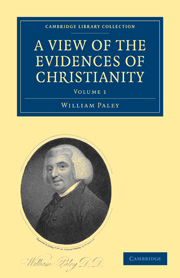Book contents
- Frontmatter
- HONOURABLE AND RIGHT REVEREN
- PREPARATORY CONSIDERATIONS
- PART I OF THE DIRECT HISTORICAL EVIDENCE OF CHRISTIANITY, AND WHEREIN IT IS DISTINGUISHED FROM THE EVIDENCE ALLEGED FOR OTHER MIRACLES
- CHAPTER I
- CHAPTER II
- CHAPTER III
- CHAPTER IV
- CHAPTER V
- CHAPTER VI
- CHAPTER VII
- CHAPTER VIII
- CHAPTER IX
- SECTION I
- SECTION II
- SECTION III
- SECTION IV
- SECTION V
- SECTION VI
- SECTION VII
- SECTION VIII
- SECTION IX
- SECTION X
- SECTION XI
- CHAPTER X
- CHAPTER I
- Frontmatter
- HONOURABLE AND RIGHT REVEREN
- PREPARATORY CONSIDERATIONS
- PART I OF THE DIRECT HISTORICAL EVIDENCE OF CHRISTIANITY, AND WHEREIN IT IS DISTINGUISHED FROM THE EVIDENCE ALLEGED FOR OTHER MIRACLES
- CHAPTER I
- CHAPTER II
- CHAPTER III
- CHAPTER IV
- CHAPTER V
- CHAPTER VI
- CHAPTER VII
- CHAPTER VIII
- CHAPTER IX
- SECTION I
- SECTION II
- SECTION III
- SECTION IV
- SECTION V
- SECTION VI
- SECTION VII
- SECTION VIII
- SECTION IX
- SECTION X
- SECTION XI
- CHAPTER X
- CHAPTER I
Summary
The historical books of the New Testament, meaning thereby the four Gospels and the Acts of the Apostles, are quoted, or alluded to, by a series of Christian writers, beginning with those who were contemporary with the apostles, or who immediately followed them, and proceeding in close and regular succession from their time to the present.
The medium of proof stated in this proposition is, of all others, the most unquestionable, the least liable to any practices of fraud, and is not diminished by the lapse of ages. Bishop Burnet, in the History of his Own Times, inserts various extracts from Lord Clarendon's History. One such insertion is a proof, that Lord Clarendon's History was extant at the time when Bishop Burnet wrote, that it had been read by Bishop Burnet, that it was received by Bishop Burnet as a work of Lord Clarendon, and also regarded by him as an authentic account of the transactions which it relates; and it will be a proof of these points a thousand years hence, or as long as the books exist. Quintilian having quoted as Cicero's, that well-known trait of dissembled vanity;—
“ Si quid est in me ingenii, Judices, quod sentio quam sit exiguum;”—
the quotation would be strong evidence, were there any doubt, that the oration, which opens with this address, actually came from Cicero's pen.
- Type
- Chapter
- Information
- A View of the Evidences of ChristianityIn Three Parts, pp. 172 - 216Publisher: Cambridge University PressPrint publication year: 2009First published in: 1794



